-
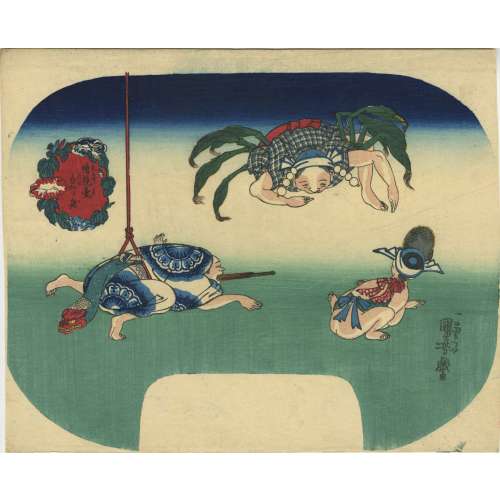 Artist: Utagawa Kuniyoshi [歌川 國芳] (Japanese, 1798 – 1861). Publisher: Ibaya Senzaburō [伊場屋仙三郎] (Japanese, c. 1815 – 1869), no publisher's seal on this print. Another title of this image provided by Sebastian Izzard is Acrobats becoming animals. The series Brother Pictures for Comparison [絵鏡台合かゝ身] (e-kyôdai awase kagami) can be found at Kuniyoshi Project: "This series consists of pairs of fan prints, with one print of each pair being a silhouette of the other. The series is not listed in Kuniyoshi by Basil William Robinson (Victoria and Albert Museum, London, 1961)". The series is attributed to c. 1840. Signed: Ichiyosai Kuniyoshi ga. Size: Size: Uchiwa-e (untrimmed fan print) 227 x 299 mm.
Artist: Utagawa Kuniyoshi [歌川 國芳] (Japanese, 1798 – 1861). Publisher: Ibaya Senzaburō [伊場屋仙三郎] (Japanese, c. 1815 – 1869), no publisher's seal on this print. Another title of this image provided by Sebastian Izzard is Acrobats becoming animals. The series Brother Pictures for Comparison [絵鏡台合かゝ身] (e-kyôdai awase kagami) can be found at Kuniyoshi Project: "This series consists of pairs of fan prints, with one print of each pair being a silhouette of the other. The series is not listed in Kuniyoshi by Basil William Robinson (Victoria and Albert Museum, London, 1961)". The series is attributed to c. 1840. Signed: Ichiyosai Kuniyoshi ga. Size: Size: Uchiwa-e (untrimmed fan print) 227 x 299 mm. -
![[Barham, Richard Harris]. The Ingoldsby Legends or Mirth and Marvels by Thomas Ingoldsby, esquire / First, Second and Third Series - 3 volumes; Illustr.: George Cruikshank and John Leech. — London: Richard Bentley, 1840-1847. — Vol. 1: Printed by London: Samuel Bentley, 1840. pp.: ff, [2 blank] [i ht] [ii colophon] [title, verso blank] [iii] iv-v [vi blank] [contents, list of ill.] [blank, etching on verso] [1] 2-338 [339] [7, incl. orig. FC and Sp.] bf, 6 plates: 1 by Buss, 3 by Leech, 2 by Cruikshank. — Vol. 2: Printed by London: S. & J. Bentley, Wilson, and Fley, 1842. pp.: ff, [2 blank] [i ht] [ii colophon] [title, verso blank] [v] vi-vii [viii blank] [contents, verso blank] [blank, etching on verso] [1] 2-288 [6, incl. orig. FC and Sp.] bf, 7 plates: 3 by Leech, 4 by Cruikshank. — Vol. 3: Printed by London: S. & J. Bentley, Wilson, and Fley, 1847. pp.: ff, [2 blank] [i ht] [ii colophon] [title, verso blank] [iii] iv-vi [contents, list of ill.] [blank, portrait on verso] [1] 2-364 [6, incl. orig. FC and Sp.] bf, 6 plates: 2 portraits, 2 by Leech, 2 by Cruikshank.](https://varshavskycollection.com/wp-content/uploads/2021/02/LIB-2483-1.2020-c-1-500x500.jpeg) 3-volume set, 1st edition, with original wrappers. Vol. 1: Half-title: THE | INGLODSBY LEGENDS. Title (in black and red, emblematic, engraved): THE | Ingoldsby Legends | OR | MIRTH AND MARVELS | by | THOMAS INGOLDSBY | ESQUIRE | In frame: | LONDON. | RICHARD BENTLEY. | MDCCCXL. | Under the frame: J. S. GWILT. | INV. Pagination: ffl, [2] – blanks, [i, ii] – h.t./ colophon, [2] – t.p. / verso blank, [iii] iv-v [vi] – blank, contents / list of ill., blank / etching, [1] 2-338 [339], [7] incl. orig. covers and spine bound in, bfl; 6 plates: 1 by Buss, 3 by Leech, 2 by Cruikshank. Vol. 2: Half-title: THE | INGLODSBY LEGENDS. |—| SECOND SERIES.|| Title (in black and red, emblematic, engraved): THE | Ingoldsby Legends | OR | MIRTH AND MARVELS | by | THOMAS INGOLDSBY | ESQUIRE | SECOND SERIES | In frame: | LONDON | RICHARD BENTLEY. | MDCCCXLII. | Under the frame: G. COOK SCULPo|| Pagination: ffl, [2] – blanks, [i, ii] – h.t. / colophon, [iii, iv] – t.p. / verso blank, [v] vi-vii [viii ] – blank, contents / blank, blank / etching, [1] 2-288 [6], incl. orig. covers and spine bound in, bfl; 7 plates: 3 by Leech, 4 by Cruikshank. Vol. 3: Half-title: THE | INGLODSBY LEGENDS. |—| THIRD SERIES.|| Title (in black and red, emblematic, engraved): THE | Ingoldsby Legends | OR | MIRTH AND MARVELS | by | THOMAS INGOLDSBY | ESQUIRE | THIRD SERIES | In frame: | LONDON | RICHARD BENTLEY. | MDCCCXLVII. | Under the frame: COOK || Pagination: ffl, [2] – blanks] [i, ii] – h.t. / colophon, [2] – t.p. / verso blank], [iii] iv-vi – contents / list of ill., blank / portrait, [1] 2-364 [6], incl. orig. covers and spine bound in, bfl; 6 plates: 2 portraits, 2 by Leech, 2 by Cruikshank. Binding: 3 volumes, 8vo, 20.5 x 13.5 cm, hardcover, full carmine morocco, triple ruled in gilt, top edge gilt, slightly raised bands, gilt lettering and double fillet gilt panels to spine by T. W. Morrell & Co. (London) for Brentano's bookstore in New York. 6, 7, and 6 (19 total) plates inset. The original brown figured cloth covers and spines preserved at the end of each volume. Catalogue raisonné: Albert M. Cohn, 1924: №50, p.20. Contrary to A. Cohn's description, the first etching in the first series is signed “Dalton del.” bottom left and “Buss sculp.” bottom right. It has been suggested that the name Dalton might refer to Richard Harris Dalton Barham (British, 1815-1886). Robert William Buss (1804 – 1875). Portrait (v.3, p.1): John William Cook (fl.1819 - 1862) after Richard James Lane (British, 1800 – 1872). Portrait (v.3, p.127): Henry Griffiths after Dalton. Seller's description: First editions, mixed states, in full crimson levant morocco by Morrel for Brentanos, New York. Vol.1, p. 236 is NOT blank, but unpaginated; Vol. 2 does NOT have a list of ill's on verso of contents; Vol. 3, p. 351 'to pot' NOT run together. Cloth spine and front cover bound in the back of each volume, all volumes have half-titles, with engraved titles and 19 plates by Cruikshank, Leech, et al. Conforms in the main to Sadlier 156b, 156e, and 156f.
3-volume set, 1st edition, with original wrappers. Vol. 1: Half-title: THE | INGLODSBY LEGENDS. Title (in black and red, emblematic, engraved): THE | Ingoldsby Legends | OR | MIRTH AND MARVELS | by | THOMAS INGOLDSBY | ESQUIRE | In frame: | LONDON. | RICHARD BENTLEY. | MDCCCXL. | Under the frame: J. S. GWILT. | INV. Pagination: ffl, [2] – blanks, [i, ii] – h.t./ colophon, [2] – t.p. / verso blank, [iii] iv-v [vi] – blank, contents / list of ill., blank / etching, [1] 2-338 [339], [7] incl. orig. covers and spine bound in, bfl; 6 plates: 1 by Buss, 3 by Leech, 2 by Cruikshank. Vol. 2: Half-title: THE | INGLODSBY LEGENDS. |—| SECOND SERIES.|| Title (in black and red, emblematic, engraved): THE | Ingoldsby Legends | OR | MIRTH AND MARVELS | by | THOMAS INGOLDSBY | ESQUIRE | SECOND SERIES | In frame: | LONDON | RICHARD BENTLEY. | MDCCCXLII. | Under the frame: G. COOK SCULPo|| Pagination: ffl, [2] – blanks, [i, ii] – h.t. / colophon, [iii, iv] – t.p. / verso blank, [v] vi-vii [viii ] – blank, contents / blank, blank / etching, [1] 2-288 [6], incl. orig. covers and spine bound in, bfl; 7 plates: 3 by Leech, 4 by Cruikshank. Vol. 3: Half-title: THE | INGLODSBY LEGENDS. |—| THIRD SERIES.|| Title (in black and red, emblematic, engraved): THE | Ingoldsby Legends | OR | MIRTH AND MARVELS | by | THOMAS INGOLDSBY | ESQUIRE | THIRD SERIES | In frame: | LONDON | RICHARD BENTLEY. | MDCCCXLVII. | Under the frame: COOK || Pagination: ffl, [2] – blanks] [i, ii] – h.t. / colophon, [2] – t.p. / verso blank], [iii] iv-vi – contents / list of ill., blank / portrait, [1] 2-364 [6], incl. orig. covers and spine bound in, bfl; 6 plates: 2 portraits, 2 by Leech, 2 by Cruikshank. Binding: 3 volumes, 8vo, 20.5 x 13.5 cm, hardcover, full carmine morocco, triple ruled in gilt, top edge gilt, slightly raised bands, gilt lettering and double fillet gilt panels to spine by T. W. Morrell & Co. (London) for Brentano's bookstore in New York. 6, 7, and 6 (19 total) plates inset. The original brown figured cloth covers and spines preserved at the end of each volume. Catalogue raisonné: Albert M. Cohn, 1924: №50, p.20. Contrary to A. Cohn's description, the first etching in the first series is signed “Dalton del.” bottom left and “Buss sculp.” bottom right. It has been suggested that the name Dalton might refer to Richard Harris Dalton Barham (British, 1815-1886). Robert William Buss (1804 – 1875). Portrait (v.3, p.1): John William Cook (fl.1819 - 1862) after Richard James Lane (British, 1800 – 1872). Portrait (v.3, p.127): Henry Griffiths after Dalton. Seller's description: First editions, mixed states, in full crimson levant morocco by Morrel for Brentanos, New York. Vol.1, p. 236 is NOT blank, but unpaginated; Vol. 2 does NOT have a list of ill's on verso of contents; Vol. 3, p. 351 'to pot' NOT run together. Cloth spine and front cover bound in the back of each volume, all volumes have half-titles, with engraved titles and 19 plates by Cruikshank, Leech, et al. Conforms in the main to Sadlier 156b, 156e, and 156f. -
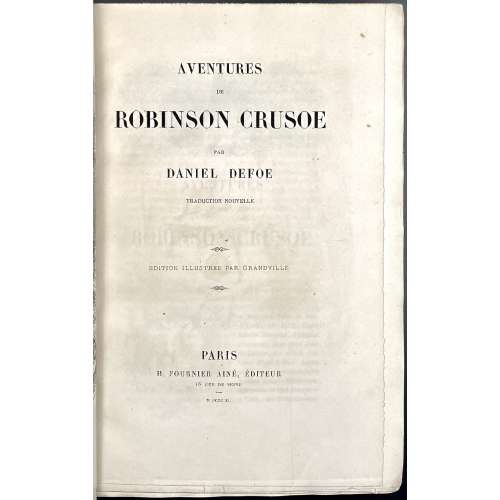 Title page: AVENTURES | DE | ROBINSON CRUSOE | PAR | DANIEL DEFOE | TRADUCTION NOUVELLE | ☙ |EDITION ILLUSTREE PAR GRANDVILLE | ❧ |PARIS | H. FOURNIER AINÉ, ÉDITEUR | 16 RUE DE SEINE | — | M DCCC XL || {sic: no accents in EDITION ILLUSTREE) Pagination: [4] [1]-610, [2] [1]-4., 620 pp. total plus 82 leaves of plates, unpaginated. Collation: 2 binder’s blank leaves, front publisher’s wrapper, h.t / imprint, 2 copies of engraved frontispiece on china paper, t.p. / blank, etc., … text..., back wrapper and spine bound in; 4to: π2 [1]-774 (310 leaves total) plus 40 x 2 plates extraneous to collation. Illustrations: 2 head- and 2 tailpieces, 2 initials, 159 vignettes, and 40 lettered plates each in two variants: one printed on a regular page, and one printed on India paper and pasted to a page. Page size: 24 x 15 cm. Frontispiece: Cut on wood by Louis-Henri Brevière after J. J. Grandville and Français. “Robinson sits on a throne-like chair framed by exotic palm trees. The sculptural and quasi-royal representation of Robinson is flanked by his faithful dog and parrot. The hero’s tools (the gun and the axe) are prominently displayed. He looks to the horizon away to the left, rather than to the tiny ship that can be seen on the horizon. His overcoming of life’s difficult events is at the core of the representation. The massive plinth reinforces the aura of the hero, as do the tiny people admiring the sculpture and learning about the heroic figure. Friday is discreetly represented in a medallion on the plinth along with other decorations including goats and a «savage»". [Sitzia, E. (2020). Lost in Intersemiotic Translation? J.J. Grandville’s Illustration of Robinson Crusoe. Journal for Literary and Intermedial Crossings, 5(2). https://clic.research.vub.be/sites/default/files/atoms/files/SITZIA_FIN.pdf] The monument has an inscription: “ FERNAND | SUEZ” which we deciphered as either a tribute to Juan Fernández (Spanish, c. 1536 – c. 1604) or as a mention of the place where Crusoe’s adventures took place: Archipiélago Juan Fernández to which Isla Róbinson Crusoe belongs. Binding: 24.8 x 16.4 cm, by Emile Mercier, half green crushed morocco over marbled boards, gilt-ruled, spine ornately gilt, sunned to orange tone, marbled endpapers, publisher's pale yellow wrappers bound in; only the top edge trimmed. Contributors: Daniel Defoe (British, 1660 – 1731) – author. J. J. Grandville [Gèrard, Isidore-Adolphe] (French, 1803 – 1847) – artist. François-Louis Français (French, 1814 – 1897) – artist (frontispiece, landscapes). Engravers: John Quartley (British, fl. 1835 – 1867) Matthew Urlwin Sears (British, 1799 – 1870) Adolphe Best (French, 1808 – 1860) One of the Guillaumots: Eugène Guillaumot (French, Paris 1813–1869), or Auguste Etienne Guillaumot (French,1844 – 1890), or his father Auguste-Alexandre Guillaumot (French, 1815 – 1892) Laisné [Alfred, Adèle, and Aglaé] (French, active 1835–1868) Antoine-Alphée Piaud (French, 1813 – 1867) Louis Dujardin (French, 1808 – 1859) A. Hans (nothing is known) Jean Louis Joseph Camille Lacoste (French, 1809 – 1866) Louis-Henri Brevière (French, 1797 – 1869) – vignettes. Provenance: Bishop, Cortlandt Field (American, 1870 – 1935) – bookplate; Mary S. Collins – bookplate by J. H. Fincken Robin F. Satinsky (American, 1919 – 2008) – Robin Collection bookplate. Catalogue raisonné: Brivois (1883) p. 155; Ray (French): № 193, p. 272; Carteret (1927): p. 241. All indicated in-8vo, which doesn't correspond to our in-4to copy.
Title page: AVENTURES | DE | ROBINSON CRUSOE | PAR | DANIEL DEFOE | TRADUCTION NOUVELLE | ☙ |EDITION ILLUSTREE PAR GRANDVILLE | ❧ |PARIS | H. FOURNIER AINÉ, ÉDITEUR | 16 RUE DE SEINE | — | M DCCC XL || {sic: no accents in EDITION ILLUSTREE) Pagination: [4] [1]-610, [2] [1]-4., 620 pp. total plus 82 leaves of plates, unpaginated. Collation: 2 binder’s blank leaves, front publisher’s wrapper, h.t / imprint, 2 copies of engraved frontispiece on china paper, t.p. / blank, etc., … text..., back wrapper and spine bound in; 4to: π2 [1]-774 (310 leaves total) plus 40 x 2 plates extraneous to collation. Illustrations: 2 head- and 2 tailpieces, 2 initials, 159 vignettes, and 40 lettered plates each in two variants: one printed on a regular page, and one printed on India paper and pasted to a page. Page size: 24 x 15 cm. Frontispiece: Cut on wood by Louis-Henri Brevière after J. J. Grandville and Français. “Robinson sits on a throne-like chair framed by exotic palm trees. The sculptural and quasi-royal representation of Robinson is flanked by his faithful dog and parrot. The hero’s tools (the gun and the axe) are prominently displayed. He looks to the horizon away to the left, rather than to the tiny ship that can be seen on the horizon. His overcoming of life’s difficult events is at the core of the representation. The massive plinth reinforces the aura of the hero, as do the tiny people admiring the sculpture and learning about the heroic figure. Friday is discreetly represented in a medallion on the plinth along with other decorations including goats and a «savage»". [Sitzia, E. (2020). Lost in Intersemiotic Translation? J.J. Grandville’s Illustration of Robinson Crusoe. Journal for Literary and Intermedial Crossings, 5(2). https://clic.research.vub.be/sites/default/files/atoms/files/SITZIA_FIN.pdf] The monument has an inscription: “ FERNAND | SUEZ” which we deciphered as either a tribute to Juan Fernández (Spanish, c. 1536 – c. 1604) or as a mention of the place where Crusoe’s adventures took place: Archipiélago Juan Fernández to which Isla Róbinson Crusoe belongs. Binding: 24.8 x 16.4 cm, by Emile Mercier, half green crushed morocco over marbled boards, gilt-ruled, spine ornately gilt, sunned to orange tone, marbled endpapers, publisher's pale yellow wrappers bound in; only the top edge trimmed. Contributors: Daniel Defoe (British, 1660 – 1731) – author. J. J. Grandville [Gèrard, Isidore-Adolphe] (French, 1803 – 1847) – artist. François-Louis Français (French, 1814 – 1897) – artist (frontispiece, landscapes). Engravers: John Quartley (British, fl. 1835 – 1867) Matthew Urlwin Sears (British, 1799 – 1870) Adolphe Best (French, 1808 – 1860) One of the Guillaumots: Eugène Guillaumot (French, Paris 1813–1869), or Auguste Etienne Guillaumot (French,1844 – 1890), or his father Auguste-Alexandre Guillaumot (French, 1815 – 1892) Laisné [Alfred, Adèle, and Aglaé] (French, active 1835–1868) Antoine-Alphée Piaud (French, 1813 – 1867) Louis Dujardin (French, 1808 – 1859) A. Hans (nothing is known) Jean Louis Joseph Camille Lacoste (French, 1809 – 1866) Louis-Henri Brevière (French, 1797 – 1869) – vignettes. Provenance: Bishop, Cortlandt Field (American, 1870 – 1935) – bookplate; Mary S. Collins – bookplate by J. H. Fincken Robin F. Satinsky (American, 1919 – 2008) – Robin Collection bookplate. Catalogue raisonné: Brivois (1883) p. 155; Ray (French): № 193, p. 272; Carteret (1927): p. 241. All indicated in-8vo, which doesn't correspond to our in-4to copy. -
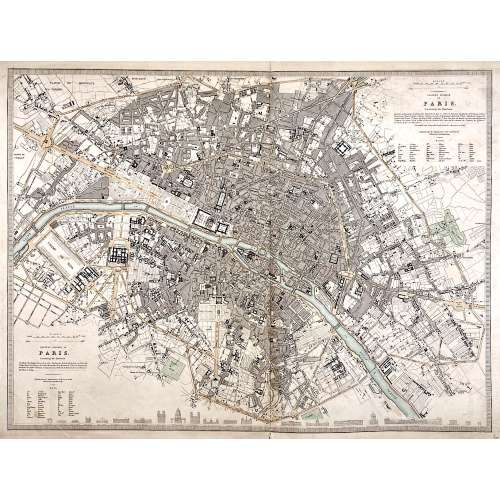 Top right: EASTERN DIVISION OF | PARIS. | Containing the Quartiers | {5 lines in italic} | Published under the Superintendence of the Society for the | Diffusion of Useful Knowledge || Bottom left: WESTERN DIVISION OF | PARIS. | Containing the Quartiers | {4 lines in italic} | Published under the Superintendence of the Society for the | Diffusion of Useful Knowledge || The map is framed, but there is no lettering beneath the frame to identify the cartographer, engraver, and publisher. However, we can attribute it to William Barnard Clarke (British, 1806 – 1865) and John Shury (fl. c. 1814-1844). The publisher is either Baldwin & Cradock or Chapman and Hall. Dimensions: Sheet: 40 x 60.8 cm; Image: 40 x 53.5 cm.
Top right: EASTERN DIVISION OF | PARIS. | Containing the Quartiers | {5 lines in italic} | Published under the Superintendence of the Society for the | Diffusion of Useful Knowledge || Bottom left: WESTERN DIVISION OF | PARIS. | Containing the Quartiers | {4 lines in italic} | Published under the Superintendence of the Society for the | Diffusion of Useful Knowledge || The map is framed, but there is no lettering beneath the frame to identify the cartographer, engraver, and publisher. However, we can attribute it to William Barnard Clarke (British, 1806 – 1865) and John Shury (fl. c. 1814-1844). The publisher is either Baldwin & Cradock or Chapman and Hall. Dimensions: Sheet: 40 x 60.8 cm; Image: 40 x 53.5 cm. -
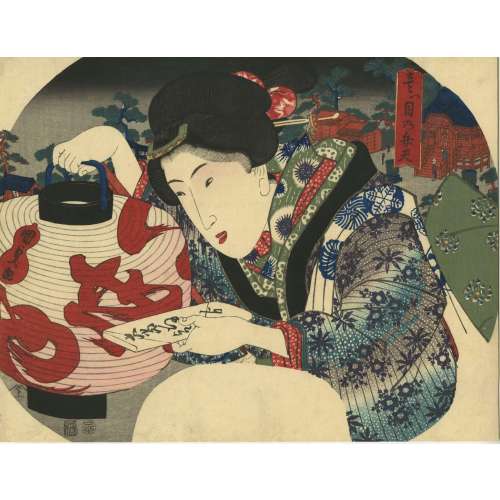 Artist: Utagawa Kunisada [歌川 国貞] a.k.a. Utagawa Toyokuni III [三代歌川豊国] (Japanese, 1786 – 1865). Signed: Kunisada ga [国貞画] in a red double-gourd cartouche. Publisher: Iseya Sōemon [伊勢屋惣右衛門] (Japanese, c. 1776 – 1862). Date seal and kiwame censor seal: 1840 (Tenpō 11). Media: Untrimmed fan print (uchiwa-e), 227 x 293 mm. Title: Benzaiten Shrine at Honjō Block One [ひとつ目乃弁天] (Hitotsume no Benten). Provenance: The Collection of Paul F. Walter, Christie's, New York, 2017, lot 341; sold together with 5 other fan prints for $25,000. Before: Christie's, New York, 1997, lot 93 ($5,520). Ref: [LIB-1693.2018] The Collection of Paul Walter. — NY: Christie's, 2017, p. 363. Ref: Israel Goldman, Catalogue 2018, № 31: "Utagawa Kunisada (1786-1865) A Woman Reading a Letter by the Light of a Lantern. Hitotsume no Benten (One-eyed Benten). 1840. Fan print. Provenance: Japanese Prints, Paintings and Screens, Christie's, New York, 1997, lot 93 ($5,520), The Collection of Paul F. Walter, Christie's, New York, 2017, lot 341. Fine impression and colour. Expertly restored wormholes in the lower margin." Markus Sesko comment regarding the series title: "Some time between in the latter half of the 17th century, blind acupuncturist Sugiyama Waichi (1614–1694) cured a neurotic disease afflicting Shōgun Tokugawa Tsunayoshi. Tsunayoshi asked Sugiyama what he would like as a reward, he answered that all that he would really desire was just one functioning eye. Now here we arrive at a wordplay. “One eye,” as you know, is Hitotsu-me in Japanese. As Tsunayoshi obviously could not reward Sugiyama with an eye, he gave him the entire first block of the Honjō neighbourhood in Edo, measuring about 1.2 ha. So, Honjō Block One is Honjō Hitotsu-me in Japanese as me not only means “eye,” but also “number.” Sugiyama moved there, but as he was praying to Benzaiten enshrined in the Enoshima-jinja southwest of Kamakura, Tsunayoshi gave Sugiyama permission to erect a small shrine on his new premises that was then dedicated to Benzaiten as well. To spare the old blind man the long trip so to speak. This shrine was named Honjō Hitotsu-me Benzaiten Shrine, short Hitotsu-me Benten, meaning the “Benzaiten Shrine at Honjō Block One.” That is, the label in the print refers to this context, i.e., location, not to a one-eyed Benzaiten. Sugiyama also had some rock formations of the “original” Benzaiten Shrine at Enoshima copied at his place, which was named Iwaya (い王や) (see picture attached). The lantern the woman is holding in the print is inscribed “Imuya” (い無や). Usually, the character mu (無) is not read wa in replacing a syllable, so maybe Imuya can be attributed to artistic freedom on part of Utagawa Kunisada, referring to the local Iwaya garden?"
Artist: Utagawa Kunisada [歌川 国貞] a.k.a. Utagawa Toyokuni III [三代歌川豊国] (Japanese, 1786 – 1865). Signed: Kunisada ga [国貞画] in a red double-gourd cartouche. Publisher: Iseya Sōemon [伊勢屋惣右衛門] (Japanese, c. 1776 – 1862). Date seal and kiwame censor seal: 1840 (Tenpō 11). Media: Untrimmed fan print (uchiwa-e), 227 x 293 mm. Title: Benzaiten Shrine at Honjō Block One [ひとつ目乃弁天] (Hitotsume no Benten). Provenance: The Collection of Paul F. Walter, Christie's, New York, 2017, lot 341; sold together with 5 other fan prints for $25,000. Before: Christie's, New York, 1997, lot 93 ($5,520). Ref: [LIB-1693.2018] The Collection of Paul Walter. — NY: Christie's, 2017, p. 363. Ref: Israel Goldman, Catalogue 2018, № 31: "Utagawa Kunisada (1786-1865) A Woman Reading a Letter by the Light of a Lantern. Hitotsume no Benten (One-eyed Benten). 1840. Fan print. Provenance: Japanese Prints, Paintings and Screens, Christie's, New York, 1997, lot 93 ($5,520), The Collection of Paul F. Walter, Christie's, New York, 2017, lot 341. Fine impression and colour. Expertly restored wormholes in the lower margin." Markus Sesko comment regarding the series title: "Some time between in the latter half of the 17th century, blind acupuncturist Sugiyama Waichi (1614–1694) cured a neurotic disease afflicting Shōgun Tokugawa Tsunayoshi. Tsunayoshi asked Sugiyama what he would like as a reward, he answered that all that he would really desire was just one functioning eye. Now here we arrive at a wordplay. “One eye,” as you know, is Hitotsu-me in Japanese. As Tsunayoshi obviously could not reward Sugiyama with an eye, he gave him the entire first block of the Honjō neighbourhood in Edo, measuring about 1.2 ha. So, Honjō Block One is Honjō Hitotsu-me in Japanese as me not only means “eye,” but also “number.” Sugiyama moved there, but as he was praying to Benzaiten enshrined in the Enoshima-jinja southwest of Kamakura, Tsunayoshi gave Sugiyama permission to erect a small shrine on his new premises that was then dedicated to Benzaiten as well. To spare the old blind man the long trip so to speak. This shrine was named Honjō Hitotsu-me Benzaiten Shrine, short Hitotsu-me Benten, meaning the “Benzaiten Shrine at Honjō Block One.” That is, the label in the print refers to this context, i.e., location, not to a one-eyed Benzaiten. Sugiyama also had some rock formations of the “original” Benzaiten Shrine at Enoshima copied at his place, which was named Iwaya (い王や) (see picture attached). The lantern the woman is holding in the print is inscribed “Imuya” (い無や). Usually, the character mu (無) is not read wa in replacing a syllable, so maybe Imuya can be attributed to artistic freedom on part of Utagawa Kunisada, referring to the local Iwaya garden?" -
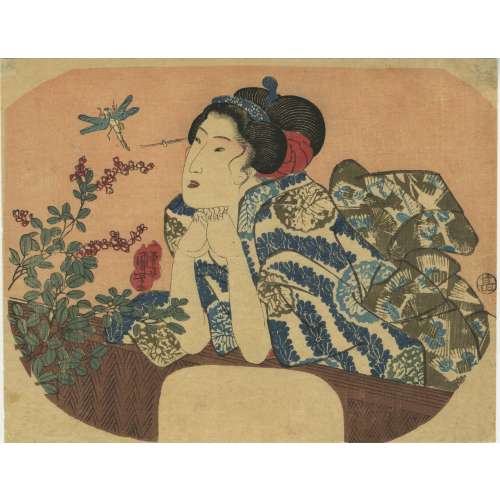 Artist: Utagawa Kuniyoshi [歌川 國芳] (1798 – 1861). A beauty leaning on a fence and watching a dragonfly hovering above a flowering plant. Signed: Ichiyûsai Kuniyoshi ga (一勇斎 國芳 画) in a double gourd-shaped red cartouche. Publisher: Maruya Jinpachi, seal Jin [甚] (Marks 08-088 | 294d). No date/censor seal. Media: Fan print (uchiwa-e, 団扇絵), 234 x 301 mm.
Artist: Utagawa Kuniyoshi [歌川 國芳] (1798 – 1861). A beauty leaning on a fence and watching a dragonfly hovering above a flowering plant. Signed: Ichiyûsai Kuniyoshi ga (一勇斎 國芳 画) in a double gourd-shaped red cartouche. Publisher: Maruya Jinpachi, seal Jin [甚] (Marks 08-088 | 294d). No date/censor seal. Media: Fan print (uchiwa-e, 団扇絵), 234 x 301 mm.


